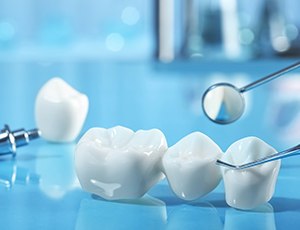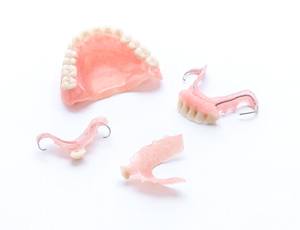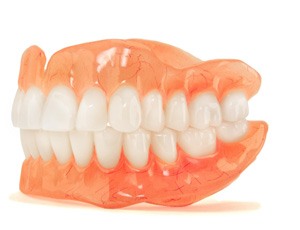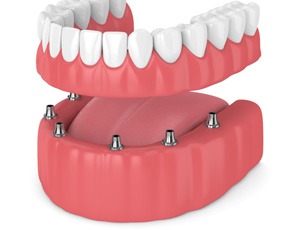Dentures and Partials – Richardson, TX
For Full Smile Repairs
Missing teeth can have a large, negative impact on your self-image; you’ll also have a harder time eating a wide variety of foods, which can lead to poor nutrition and health problems. A mouth full of functional teeth is important for maintaining high quality of life. If most or all of your teeth are missing, Canyon Creek Family Dentistry of Richardson can provide you with partials or full dentures in Richardson to create a strong and beautiful smile.
Who’s a Good Candidate for Dentures?

If you’re dealing with tooth loss, chances are you qualify for dentures. That much is natural – the restorations’ requirements aren’t stringent. Still, maybe you can’t tell whether dentures are your best option. Luckily, you can learn the answer by consulting our dentists. They’re able to perform oral exams to see if you’re a good dentures candidate. To learn more about the matter, just keep reading or call our office today!
Effects of Missing Teeth

First things first: it’s a good idea to assess tooth loss’ causes and effects. By knowing such facts, you’ll see how dentures can help your smile.
As it happens, people lose teeth for various reasons. Some develop gum disease, which erodes the tissues keeping teeth in place. Meanwhile, others suffer tooth decay until a pearly white falls out. You could even lose a tooth from an accident or injury if you're unlucky. After all, enough physical force can dislodge or knock teeth out.
Should you go without teeth, you can expect specific complications. One is that you’ll immediately find it harder to eat, speak, and even smile. Another effect is jawbone erosion that, left unchecked, results in facial collapse. The spaces will also shift your teeth until they’re lost if you don’t fill them.
What Qualifies You for Dentures?

In most cases, tooth loss alone qualifies you for dentures. With that being said, there are other things to consider before treatment.
Oral health, in particular, can affect how or whether dentures suit you. For instance, the prosthetics may work as replacements for your decayed or sensitive teeth. Similarly, dentures won’t help if you don’t have healthy gum and jaw tissues; the new teeth would lack the support they need. Lastly, the restorations will only work long-term when you have a solid commitment to oral hygiene and care.
The number of lost teeth also impacts your qualifications. Depending on how many chompers you’re missing, you’ll need one of two possible dentures. A partial model is suitable for replacing a few teeth. A full denture, however, is likely necessary if you lack all the pearly whites along an arch.
Finances are important too. Being cheaper than other restorations, dentures are great for patients on a budget.
Alternative Tooth-Replacement Options

There's no need to worry if you aren’t a good dentures candidate. Canyon Creek Family Dentistry, you see, has other ways to restore smiles. In fact, our team can provide two additional procedures. They are:
- Dental Bridges – Dental bridges are prosthetics made of crowns fused to a pontic. Though fixed restorations, they don’t fit into your jaw’s empty sockets. Instead, they clasp onto your surrounding teeth to stay steady.
- Dental Implants – Dental implants are titanium posts placed in your jaw. Once capped with dental crowns, they look and act like natural teeth. Furthermore, implants fuse with your jaw over time. That means they won’t slip, fall, or remove any of your enamel.
What are Dentures?

Dentures are a form of dental restoration used to replace teeth in one of the jaws; they’re typically made with a gum-colored plastic base and ceramic or acrylic teeth.
There are three kinds of dentures you can get depending on your needs:
- Full Dentures: These can replace an entire arch of missing teeth. Modern dentures are designed to look as lifelike as possible, giving you the self-confidence to laugh and smile in front of others. Usually, full dentures stay on the gums using natural suction or adhesive.
- Implant-Retained Dentures: Your false teeth can be placed on small, titanium posts that have been inserted into the jaw. Implants can stop your jawbone from deteriorating due to missing teeth and provide better stability for your dentures.
- Partial Dentures: If only part of your smile needs repairs, custom-made partials can be used to replace multiple teeth at once; this prevents remaining teeth from drifting out of place and allow you to continue eating and speaking normally. Partial dentures are held in place with a metal clasp.
How are Dentures Made?

Over the last several decades, dentures in Richardson have come a long way, going from replacement teeth that once appeared plastic-looking and not so realistic to having lifelike qualities that make them virtually indistinguishable from natural teeth. This is because the techniques, superior craftsmanship, and materials used are of the highest quality, providing our patients with impeccable prosthetics that have been created with care.
What are Dentures Made Of?

Dentures have multiple different parts that can be crafted from a variety of materials. At Canyon Creek Family Dentistry of Richardson, we use the highest quality of materials to ensure long-lasting and perfectly functioning prosthetics.
Here are some of the types of materials your dentures can be made from:
- The base of dentures are typically crafted from durable materials like acrylic, nylon or resin, as each of these can be custom color-matched to the shade of your natural gums. That way, when secured in the mouth, they blend in with the rest of your smile.
- The replacement teeth that are affixed to the base of your denture are made from materials that mimic the natural appearance of teeth, like porcelain and ceramic. These are able to reflect light like enamel does, and they come in a wide range of tooth-colored shades.
The Denture Creation Process

All of our dentures are hand-crafted in our trusted laboratory using the impressions that we capture in-office. Once they arrive at the lab, a technician will begin the process by crafting a model of your mouth that they’ll place in a metal clamp that resembles the jaw. They’ll carve the wax model to look identical to your gums and teeth.
Once the wax mold has been plastered, the technician will melt away the wax, only leaving the plaster behind. This can then be injected with gum-colored resin and ceramic to create the base and teeth of your prosthetic. Finally, the lab technician will remove any excess material from the denture and trim and polish the restoration, making it look identical to a natural smile.
Adjusting to Your New Dentures

Once your dentures are ready, the lab will send them to our office, where our team will call you in for your initial fitting to make sure they work and function as intended. Our team will go over what you can expect as you’re adjusting to them. Typically, this process takes about a month, and you’ll likely experience soreness and discomfort throughout that time as your mouth is getting used to supporting your dentures. If you have any questions or concerns, don’t hesitate to contact our team.
The Benefits of Dentures

When you suffer tooth loss, certain tasks often become challenging. Things you’d usually take for granted – eating, speaking, smiling, etc. – may even feel tiresome. It’s a good thing, then, that dentures are so transformative. Given the right type, this restoration can drastically raise your quality of life! In fact, the benefits of dentures in Richardson are rich and varied. To learn more about them, just keep reading or book a consultation visit to our office.
Psychological Benefits

Losing your teeth can be a severe blow to your mental health. Not only do smile gaps harm self-esteem and body image, but they also raise your risk of feeling sad and depressed. Missing teeth can also prompt a retreat from social life, which only worsens mood issues.
Luckily, dentures can protect you from low feelings. The prosthetics restore your smile, letting you recover confidence in your looks. From there, you’ll feel less anxious about how you come across and see improvements in your relationships.
Clearer Enunciation

As you might know, your teeth help you to speak. Your lips and tongue rely on them to pronounce words clearly. When those pearly whites are lost, it’s thus difficult to enunciate and avoid speech impediments.
On the bright side, dentures restore your speaking ability. They act as replacement teeth, after all, allowing your tongue to position itself properly. That said, this restoration isn’t immediate; you’ll need an adjustment period and practice to speak naturally again.
Improves Nutrition

Among other things, tooth loss can prompt you to restrict your diet. Many nutritious foods are tough in texture, making them hard to eat without a full smile. Some who lack teeth then give up on such items, which can cause indigestion and malnutrition.
Still, dentures can reverse this restriction. By filling your smile with new teeth, they’ll let you eat raw veggies, fruits, and lean proteins more easily. You’d then give your body the key nutrients it needs to maintain physical health.
Preserves Oral Health

Even in the short term, lacking teeth hampers your oral health. Smile gaps are ideal breeding grounds for bacteria, raising your risk of tooth decay and gum disease. Those same spaces also cause your other teeth to tilt and fall out, at least if left untreated.
Dentures, though, fill in your smile gaps and thus preserve your oral health. In getting rid of the spaces between teeth, they ensure your remaining pearly whites don’t tilt or decay. Furthermore, their prosthetic teeth take some of the pressure off of your other ones.
Expands Opportunities

A person’s smile is one of first things others will notice about them. In that respect, it’s crucial to how you’re evaluated in social settings. The world will thus note if you happen to lack any teeth and may respond negatively.
It’s a good thing, then, that dentures complete and restore your smile. Thanks to their lifelike and natural looks, they’ll improve your opportunities with friends, family, coworkers, and more.
Dentures Aftercare

Normally, you can trust dentures to restore your grin fully. (Why else would you bother with them?) However, you’ll still need to care for these prosthetic teeth. Dentures won’t work well without the proper upkeep. Luckily enough, Canyon Creek Family Dentistry can help: listed below are several great tips on caring for dentures. If you follow them, your new grin will last a long while. Please keep reading to learn more, or call our office for the details.
Removeable Dentures

Remove After Eating
After every meal, you should remove and rinse off your dentures. Eating causes food bits to accumulate on them. Meanwhile, rinses keep food and plaque from sticking to your new teeth. You’ll then have a lower risk of gum disease and similar issues.
All that said, avoid using hot water for these rinses. Intense heat can (and often will) warp a denture’s material. From there, it wouldn’t fit your mouth well.
Clean Your Restoration
Aside from after-meal rinses, you should also give dentures once-daily cleanings. The latter will remove germs and debris from your prosthetics.
Overall, cleaning a denture is pretty simple. Just remove the appliance from your mouth and brush it with a toothbrush. That said, remember to use hand soap instead of toothpaste. (Regular toothpaste is abrasive and erodes dentures.) Once you’re done brushing, re-insert the teeth into your mouth.
Keep Your Dentures Safe
As sturdy as they are, dentures aren’t invincible. They can break if put under enough force. So, keep your dentures safe when you aren’t using them.
There are several good ways to protect dentures. For example, you could place a towel in your sink while cleaning them. Doing so would cushion the dentures from potential falls. On the other hand, storing dentures in a case is also helpful. The container would prevent pets or kids from breaking the replacement teeth.
Remove Dentures When You Sleep
Generally, it’s not a good idea to wear dentures to bed. You should remove them before going to sleep instead. Better yet, you could soak them in a disinfecting solution overnight.
You see, wearing dentures to sleep harms your body. This practice restricts your gum circulation, leading to irritated mouth tissues. It also elevates your mouth’s plaque levels, increasing your risk of cavities and gum disease. Constant denture use can even cause pneumonia.
Notice Changes
Soon after you start wearing dentures, watch out for changes in them or your mouth. Unexpected shifts in your oral health can point to problems. If something seems amiss, you should quickly see your dentist for help.
In particular, you really should see a dentist if your denture gets damaged. Any attempt at fixing it yourself will make things worse. (After all, you’re not a trained prosthodontist.) In contrast, dentists like our own can refit or replace the dentures.
Understanding the Cost of Dentures

How much will it cost for you to enjoy a full set of teeth again? Our team will be more than happy to help you find the answer to that question; during your initial consultation, we can give you an estimate of what your dentures will cost and explain the factors that helped us arrive at that number. We will also make sure that you’re fully informed about your options for payment in order to ensure that your new teeth are as affordable as possible.
Factors That Affect the Cost of Dentures

When putting together an estimate of the cost of your dentures, we will need to ask the following questions:
- Are tooth extractions or other preparatory treatments required?
- Will you need a full denture to replace an entire arch of teeth or a partial denture to replace a specific number of teeth?
- What will your dentures be made out of?
The answers to all of these questions could end up affecting the amount you pay for dentures. Note that the cheapest dentures aren’t always the best choice; the lower price may be due to being made out of materials that break more easily. High-quality dentures that can be trusted to last longer are generally worth the extra cost.
Are Implant Dentures More Expensive?

Getting implant dentures means you will have to pay for dental implant surgery as well as each individual dental implant post. This means that you will end up paying more than you would for traditional dentures. The trade-off is that implant dentures can potentially last for more than 30 years, meaning you won’t have to pay to replace them as often as traditional dentures. And of course, there are the many health benefits associated with having dental implants placed, such as stimulating the jaw in order to prevent bone loss.
Does Dental Insurance Cover Dentures?

You can normally expect your dental insurance to pay at least part of the cost of your dentures. Coverage is typically around 50%, but it can vary depending on what plan you have. Additionally, your deductible and your annual maximum could affect the amount that your dental insurance company is willing to pay for your new teeth. If you’re not sure what your out-of-pocket costs will look like after your dental insurance benefits have been applied, our team is here to help; we can review your plan with you to make sure that you understand the specifics.
Other Options for Making Dentures Affordable

At our practice, we can help make dentures more affordable for uninsured patients by helping them apply for a CareCredit plan. Thanks to CareCredit financing, you will be able to pay for your treatment in smaller installments that are just right for your budget. There are many CareCredit plans to choose from, and some even have no interest.
Additionally, if you’re interested in getting implant overdentures, you can take advantage of our current special to schedule a complimentary consultation. This visit will include a CT scan so that we can get a good look at your jawbone and evaluate your candidacy for dental implants.
Dentures FAQs

Dentures can be a lifechanging option for patients who are missing several, most of, or all of their teeth. However, you may still have some unanswered questions about the procedure, so we’re here to help. Here are the answers to some of the most common questions we receive about dentures in Richardson. If you don’t see the information that you’re looking for below, don’t worry. Give us a call and we’d be happy to explain more about the process of getting dentures and get you started with an initial consultation.
Should I Have All My Teeth Pulled to Get Dentures?
Repairing a damaged tooth whenever possible is always preferable to replacing it. Tooth extractions of any kind will only ever be recommended if deemed absolutely necessary, like when a tooth is too damaged to save thanks to extensive decay, severe infection, or trauma that has broken off most of the enamel. If all of the teeth in an arch are decayed or infected with gum disease, replacing them with dentures may be a viable option, but we will always consider all of your options before recommending an extraction.
Can I Sleep with My Dentures?
It is generally recommended that you take your dentures out at night when you go to bed. When you first get your dentures, you will typically be told to keep them in your mouth for 24 hours, including when you sleep. After that, you should be taking them out every night. Wearing dentures restricts the circulation in your gums, leading to soft tissue irritation and potentially speeding up ridge resorption. Taking dentures out gives the gums a chance to recover and get the nutrients they need while you sleep.
Is It Hard to Talk with Dentures?
When you first get dentures, it takes time to get used to speaking with them because you’re so used to speaking with your natural teeth. The exact amount of time it takes to get used to speaking with your dentures varies from person to person. Generally, the more often you practice, the faster the adjustment proves with go. Try reading out loud to yourself and repeating difficult-to-pronounce words. Speak slowly at first, as fast speech can come out muffled.
Can You Still Eat Steak with Dentures?
Tough meats, like steak, are often difficult to chew with dentures, but it’s still possible to do so if you take the right precautions. Select tenderloin and other beef cuts that don’t contain as many connective tissues or muscle fibers. Make sure that the meat is thoroughly tenderized beforehand. Cut the steak into small, manageable pieces. The smaller they are, the easier they will be to chew.
